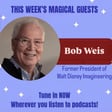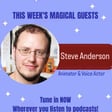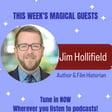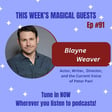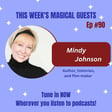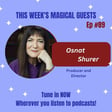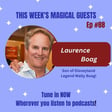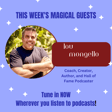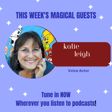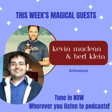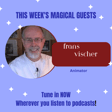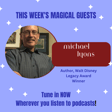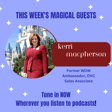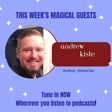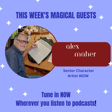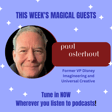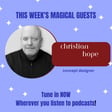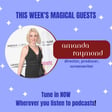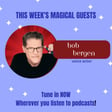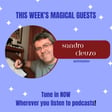Become a Creator today!Start creating today - Share your story with the world!
Start for free
00:00:00
00:00:01

Episode 86: Ron Clements
On this week's episode we sit down with director, animator, producer, and screenwriter Ron Clements!
DISCLAIMER: We are not an affiliate of he Walt Disney Company nor do we speak for the brand or the company. Any and all Disney-owned audio, characters, and likenesses are their property and theirs alone.
Recommended
Transcript
Introduction to 'Sharing the Magic'
00:00:01
Speaker
Welcome to Sharing the Magic, the podcast that takes you on a journey through the enchanting worlds of Disney. Each week, we're joined by a special guest, whether they're a magician creating moments of astonishment or a Disney expert sharing the secrets behind the magic of the happiest place on Earth. Together we'll uncover the stories, inspirations, and behind the scenes tales that bring these worlds to life.
00:00:32
Speaker
So, get ready to be spellbound and transported to a place where dreams come true.
Meet the Co-Hosts and Special Guest
00:00:54
Speaker
Good evening, everyone. Welcome to Sharing the Magic. We are beyond excited to share with you our guest for this evening. But before we do that, I want to introduce you to each of our co-hosts tonight.
00:01:09
Speaker
First of all, we have Rachel. Rachel, how are you doing this evening? I'm doing well in Pensacola, Florida. I'm very excited to talk to our guest tonight.
00:01:20
Speaker
Did a lot of research and didn't realize you did all that. And I'm so amazed and I'm so excited for tonight. Thank you, Rachel. And how about you, Dawn? Hi, welcome. I'm Dawn from Houston, Texas.
00:01:34
Speaker
And want i wish everyone happy Easter and early happy birthday to you. i don't know if I can disclose the guess yet, but it's almost his birthday from what I wrote i saw that. Yeah, I saw that too.
00:01:46
Speaker
We all researched. We all know that it's about your birthday. Okay. All right. Brian. Yeah. Hi, it's Brian from Jersey Shore.
00:01:57
Speaker
and I'm really excited. And i let's not I don't want to talk about me. Let's talk about you. And we can have James. Hi guys. I'm happy to be here. I'm excited for this guest. I mean, he kind of shaped some of the the things in our childhood in many ways.
00:02:14
Speaker
So i'm really excited talk about him and talk to him about what he's done. So yeah, let's get going. Well, not exactly my childhood. Maybe so the rest of you.
00:02:27
Speaker
I'm Lisa. I am the guest host while Barry is away for the evening. And um it is my tremendous pleasure to introduce to you ron
Ron Clements' Journey to Disney
00:02:37
Speaker
Clements. That is our guest tonight.
00:02:39
Speaker
feel like we should have the applause running. And and we are so excited that you are here. Ron's a writer, director. Now retired. I believe I saw 45 years with Walt Disney Company. That's right.
00:02:52
Speaker
That's just- Yeah, I started i started when I was 20. That's awesome. What an amazing career. And I know that's not the only place that you worked either. it looks like Hanna-Barbera before- Hanna-Barbera, yeah. Yeah.
00:03:05
Speaker
So every time that we have and ah guest, we like to ask, first off, how did you develop this love for Disney and desire to work there, go there, and all of that?
00:03:19
Speaker
Yeah, um I'm originally from Sioux City, Iowa, which is a ah small city in in the Midwest. And the big thing for me, as a kid, I grew up watching the Walt Disney show every Sunday night, and and I saw many Disney movies growing up. But the big, I would say, kind of seminal event for me was when I was nine years old, and I saw the film Pinocchio at our local theater.
00:03:45
Speaker
It was a re-release But at that time, the movies were re-released every seven years. But I saw it for the first time there, and I was just blown away by that movie.
00:03:56
Speaker
It had sort of a profound effect on me. i mean, I drew a lot as a kid, and I drew cartoon characters, but I drew drawings and drawings and drawings from Pinocchio, And it was really when I was nine years old that I decided I want to i want to work for Disney. At that time, I wanted to become a Disney animator.
00:04:15
Speaker
And that really became my goal. And so from that point on, everything was kind of geared toward how how do I do that? How do I how do i get to Disney and and get to work there? It's amazing because at the young age of nine, you knew where you were heading. and And did you become a Disney animator?
00:04:34
Speaker
I was an animator, yeah. i yeah I was very lucky the way things worked out. um And it's kind of a long story, but I'll i'll try to shorten it. But um in terms of that, yeah less ah in terms of how I did that, I had a paper out that when I was a little bit older and I saved my money and I bought a Super 8 camera so I could actually make my own animated films, which I did little Super 8 films that that um we You could do that. And the camera was able to shoot single frames so I could do animation. And when I was 15 years old, I actually got a job as a television artist at a local station. While I was going to high school, I worked after school, and I showed them my films. And we actually did local commercials, little animated commercials.
00:05:21
Speaker
And then at a certain point, I decided I wanted to make a film, a real film with a real story. And I made a film about Sherlock Holmes, I got a fair amount of attention in Iowa and and was shown to um an executive from Los Angeles who who knew some people at Hanna-Barbera. So I yeah i started working at Hanna-Barbera, came to l LA, took life drawing classes at Art Center.
00:05:46
Speaker
But I really, really, really wanted to work at Disney. I called Disney um several times and they told me that they weren't hiring. I called the personnel department and they said there were no openings.
00:05:58
Speaker
But then i actually found out from a magazine article that they actually had a talent development program that was just started in the yeah in the early 70s. And they were actually recruiting young people about my age.
00:06:11
Speaker
And I found out about that. I applied for that with my film and and my drawings. And I got accepted into that program, which was really set up after Walt Disney had passed away.
00:06:23
Speaker
That program was set up to bring in new talent and and train them. And, eventually, I got to work with one of the nine old men, Frank Thomas, who animated everything from the dwarfs mourning Snow White's death to the two dogs eating spaghetti and Lady and the Tramp, a great, great animator. And I worked with him for two years, and he was my mentor.
00:06:45
Speaker
and And then I became an animator. I was an animator for about 10 years. i was an animator. The Rescuers the first film I animated on. And then Pete's Dragon, the original live action animation combination, i did quite a bit of animation in that.
00:07:01
Speaker
And then I was a supervising animator on the Fox and the Hound. And then I um was getting more and more interested in story. And I actually moved from animation into story and um moved into directing on um the film The Great Mouse Detective, working with Bernie Mattinson, who was a legendary Disney director and producer and and working with John Musker on that film. um that um That was the first film we both directed on.
00:07:31
Speaker
Originally, it was called Basil of Baker Street, and they changed the title. We were never happy about that title change. But then um after that, I actually pitched the idea of The Little Mermaid around that time. And then and then John and I wrote the screenplay for The Little Mermaid and worked with Howard Ashman and Alan Menken directing and in writing that movie. And then we've worked together.
00:07:54
Speaker
Until we retired, we've done a lot of movies together. After that, Aladdin and Hercules, Treasure Planet, think Princess and the Frog, and then Moana was our last film. and And we both retired not too long after Moana.
00:08:09
Speaker
Wow. What an amazing um history. i like Like James said earlier, you know, that paved the way for many childhoods and even for me young adulthood.
00:08:21
Speaker
So I was thinking while you were saying all of this, You know, a lot of times i want to talk about like the power of connection. it sounds like you had the right place at the right time to hear about the talent development program.
00:08:38
Speaker
You had already paved the way with some of your animation and hard work for that. And then you got to work with, mean, I know I skipped a whole lot. But then you got to work with one of Walt Disney's nine old men, Frank Thomas.
00:08:52
Speaker
Do you mind talking a little bit about that time with him? And then I'll turn it to anyone else. Well, that was that was um that was a great experience for me getting to work with Frank. And um at the time I was working, um a lot of the nine old men had left, but Frank and and Frank Thomas, Ollie Johnston, who was in the next next room with Frank, and they were they were very close, and Mel Call, who was um sort of cantankerous, but
Behind Iconic Disney Scenes
00:09:23
Speaker
brilliant, brilliant animator. We're all still animating on on The Rescuers. and And Frank, I mean, i learned so much from Frank about acting and entertainment.
00:09:33
Speaker
Frank, I think his specialty was considered um his acting. but Some people don't even really think of animators as actors, but really that's that's the essence. ah The key to Disney animation is is is the great acting Like he did in Lady and the Tramp with the two dogs falling in love. That's real acting there.
00:09:55
Speaker
And I think um Chuck Jones once called Frank the Laurence Olivier of of animators, of Disney animation. Or animators in general, I think, because his acting was so strong. so um So I learned a lot from him about the importance of that and in terms of getting into the heads of the characters and what they're thinking.
00:10:16
Speaker
And which is more important than what they're doing or what they're saying is really to get into their heads in terms of what they're thinking and communicating that to the audience, which is behind any good acting is that and getting trying to find entertainment in sort of every moment that that you can.
00:10:33
Speaker
i also heard stories about Walt from Frank. I mean, mean, ah Frank had died in 19, I'm bad with dates, but i think it was 66, I think.
00:10:45
Speaker
um I started at Disney in 1974 and started working with Frank probably around 1975, which wasn't that long, really, since Walt had died. So his presence was still felt there a lot by those guys. And Certainly Frank revered Walt and felt that one of the big, big strengths of Walt Disney was that he could recognize talent and then he could pull it out of people so that they they were able to do things that they didn't even think they were capable of. um he was some
00:11:17
Speaker
i think that Frank felt that was kind of true of everybody that that Walt worked with. and And he had an amazing sense of story and was able to get everybody excited about the films and and and his vision for the films. And that really was so much a part of what made those films so special.
00:11:35
Speaker
I was going to say, what a great opportunity to work with Frank Thomas. And I did read something briefly about Disney was kind of against the spaghetti love scene, which iconic, right? We all know that. It's even been reenacted another you know with other people, and you know exactly what it is.
00:11:51
Speaker
But that um Frank actually drew he drew it and then presented it, and then and everyone fell in love with it. so Yeah, that's true. Yeah. What other little Easter eggs, no pun intended, since tomorrow's Easter, um do you know during that time?
00:12:07
Speaker
Yeah, there's another one that Frank told um that's pretty good. He told the Lady and the Tramp story and just Walt didn't like it and and Frank sold him on it and the rest is history. The other one he told me that was funny was during Mary Poppins.
00:12:20
Speaker
Frank and Ali both an
The Evolution of Disney Animation
00:12:22
Speaker
animated penguins, the penguins dancing with Dick Van Dyke in Mary Poppins. And what Frank told me was that um Originally, he was there on set watching Dick Van Dyke doing his dancing. course, there were no penguins there.
00:12:36
Speaker
um That was Saul. I think Dick had to imagine that. But somehow, at least the way Frank told it, he was bothering Dick Van Dyke and for whatever reason, and then he left.
00:12:47
Speaker
He had to leave. And when he saw the footage they actually shot, he was very unhappy because the way Dick Van Dyke did it, he would be kicking the penguins all all over the place.
00:12:59
Speaker
But the solution that Frank and Ali came up with, if you watch the movie, is that when he does those kicks, they duck. And and so they dodge his his kicking, which is really one of the entertaining things of the whole bit.
00:13:13
Speaker
But that that wasn't intended. That was something... he and he and Ali came up with in order to find a way to make it work. Accidents are often a good thing, right?
00:13:24
Speaker
Yeah, yeah. Sometimes they lead to some of the best things. As Bob Rouse said, there's no bad at accidents. They're all happy accidents. I want jump in here on on some of the stuff that you've done because you worked in a period of Disney animation where it was considered the dark period.
00:13:40
Speaker
With, you know, leading back to, you know, from Rescuers 4 to Fox and the Hound, that that period, it wasn't, ah those films were wonderful films and my favorite films of all time, some of them.
00:13:51
Speaker
What did you find hard working on those films in that period where the animation wasn't so, um so, so like revered as the the earlier iterations?
00:14:02
Speaker
Yeah, I mean, there again, i think what you're saying and and what we were connecting with, i mean, when I joined, it was a really strange environment because you had these old guys in their 60s and a repo approaching retirement. And then you had like these 20-year-olds. Most of the trainees who came into the program at that time were, were I was 20 when I started, and and um most of them were in their twenty s And I think even though, i mean, to me, it was great and it was wonderful, this opportunity just to learn.
00:14:34
Speaker
But I think at the same time, there was this feeling at that time that the films we were making were simply regarded as children's films. um they would An adult would never think of going to a movie like that by themselves. um I mean, there were films that families would take their kids to, ah but we didn't think of them that way. I mean, as a Disney fan growing up, um and I don't think Walt thought of them. that way as films just for kids. They're really, really good movies that are great for any audience. and
00:15:06
Speaker
And we kind of wished or looked forward, like, would there ever be a time again? Like Snow White, when it opened, was like the biggest film of all time. It was the number one film that year and was kind of a phenomenon.
00:15:19
Speaker
But in in those days, um and we were we didn't have families then, we were young. So people we knew never seemed like they saw the movies that we we were working on. And so that was kind of looking like wondering, will there be a day again when when when Disney can kind of um sort of regain its place as as films that people could get really excited about? And that was kind of the dream, i would say.
00:15:45
Speaker
and um And it happened. It took a little while, but this sort of the the new generation, kind of the baby boom generation of of Disney artists, which I was a part of, ah kind of when we sort of came into our own, um that it did it did happen. And that was that was very exciting.
00:16:02
Speaker
Certainly with Mermaid and and and films like Aladdin and then Beauty and the Beast and Lion King, ah like I turned into a really great time. um but on ah On Mermaid, John Musker and I, we were in our mid-30s, I think, when that film came out. And when we were making the film, we were in our early thirty s And we were some of the oldest people on that movie.
00:16:24
Speaker
The movie was really a film done by a lot of new people, a lot of young people who who were excited, particularly with Mermaid. I think there was this feeling that we're doing a sort of classic fairy tale. There hasn't been one since Sleeping Beauty in, I think, 59.
00:16:42
Speaker
And we really, really wanted to make a film that that could sort of stand beside those earlier
Collaborating with Robin Williams
00:16:47
Speaker
films. and And that was the goal. That's phenomenal. I mean, I wasn't trying to throw any shade on Rescuers and Fox and the Hound, because those, like said, some of the greatest movies that were ever put out. And I love, I love, my mom, that was one the first VHS's I got was Fox the Hound.
00:17:05
Speaker
And I watched that thing until it was blurry and worn out because it was such a beautiful story. And then you created, like you said, one of the the the most beautiful princesses since 59, and then going to Aladdin,
00:17:20
Speaker
ah Do you have any unique Aladdin stories, like drawing that or drawing to Robin Williams or working on any of that that ah film? Well, I mean, there are a lot of Aladdin stories, but probably the best is just working with Robin Williams, which was a great experience. John and I, we wrote the original script for Aladdin, and we wrote it for Robin.
00:17:39
Speaker
um We had him in mind mainly because we had this idea um of the genie being this shape-shifting character that could kind of do all kinds of cool things physically, and we thought the perfect voice for that would be someone like Robin.
00:17:55
Speaker
um who is kind of mercurial in his voice. He can shape-shift, if I can say it right, he can shape-shift into all these different characters um instantaneously. And that was the idea. So we wrote it, I mean, obviously Robin improvised hugely throughout that film, and that was the idea, but we wrote it in that style of improvisation. So so in reading the script, you got the idea of what it was.
00:18:19
Speaker
And um originally, Eric Goldberg, who who will we brought on as the lead animator for the Genie, he did a test. We had him do a test. We took a Robin Williams comedy album, and he did a test over some bits from the comedy album that kind of showed who the Genie was and what he could do.
00:18:37
Speaker
And at a certain point, um then we we brought Robin in. Robin came in and we showed him Eric's test and other things. It was kind of a gamble because that at one point, even after, I mean, Robin wanted to do it, but at one point they were having trouble making a deal. And and so they said, you know, give us a list of alternatives. And we said, there aren't any.
00:18:59
Speaker
This has to be Robin. We couldn't envision it with anyone else. Unfortunately, that all got worked out. And it was amazing working with him. um We developed a special process for working with him because so we wanted all this improvisation. and But we did script and we did storyboard. And we came in but when he came in for a session, usually it was four-hour sessions, we would show him the storyboards. And he had the script.
00:19:23
Speaker
And the first few times he would record, he would record the script as written just so we were sure that we had that. And then we gave him freedom to kind of just go to town and do whatever he wanted.
00:19:34
Speaker
and And he would just start adding bits, changing voices, shifting around. And every take we do, it would get longer and longer. The scene, like the first thing we ever did with him was his introduction in the movie, which is about three minutes long.
00:19:49
Speaker
And we ended up doing about 25 different takes of that scene. And by the 25th one, it was about 25 minutes long because he would be adding so much each time. And we actually had plenty of stuff way ahead of that.
00:20:03
Speaker
We felt we had plenty, but he wanted to keep going and he just wanted to keep going. And he has this weird sort of energy that he almost gains more energy the more keeps going.
00:20:14
Speaker
So by the end of a session, he was just drenched and and sweating and his his shirt was soaked. He worked so hard. I've never seen an actor work harder than that. um And we had so much stuff that the only problem was to pick what to use.
00:20:30
Speaker
And the way we did it was that we had it all transcribed. And then we re-listened to the entire session over again, John and myself and Eric Goldberg. And each of us would circle anything that we thought was particularly good.
00:20:45
Speaker
And then we had our editor edit out that all together in the scene. And the scene would the first cut of the scene would be about of a three minute scene would be about 15 minutes long. And then he would keep editing it until we got it down to where where it was the right length.
00:21:00
Speaker
And hopefully we pick the best stuff. But there are tons of outtakes, tons of great outtakes that never made it into the movie.
The Animation Directing Process
00:21:08
Speaker
And I'm sure it's so good. That's like golden. um it You could almost make a whole nother just about the genie with Robin. You know, I mean, i can't imagine cutting that because everything I see that I just he's will forever be the genie to me.
00:21:23
Speaker
and don't care how many remakes they do. That voice is in my head as the genie. And I just my kids loved it growing up. It's hilarious. um I still laugh I laugh while you're talking because I'm thinking of it.
00:21:38
Speaker
That was just a gift. That film really, I mean, Mermaid really broadened the audience, the Disney audience, and Beauty and the Beast broadened it more.
00:21:50
Speaker
But Aladdin was the first film that really broke that stigma completely in terms of being perceived as a film completely for adults. that um people went to see it, many people went to see it without bringing kids or anything, because it was it be it was a film that for everybody, and it was perceived that way, because Robin, I mean, because the film was so funny, primarily because of Robin, that it wasn't perceived as a film for kids.
00:22:18
Speaker
Definitely. And some little innuendos and things that only adults may get. Like when he was talking about what he was doing, the genie coming out of the bottle and basically was acting like a flight attendant and things like that, or like a waiter.
00:22:31
Speaker
And those are kind of funny, comical things that as a ah mom or a dad that you're like, oh yeah, I totally got that. Whereas the kids appreciating the animation and the music and um we get those little innuendos. So I love that. I love that kind of thing. I miss him. It's good that you got him.
00:22:49
Speaker
Yeah, it was it was really a privilege um to get to work with him and get to see him, just get to watch him work. I mean, we worked with many, many great actors and who have done really brilliant work.
00:23:02
Speaker
But there was something special about just sort of watching Robin robin work, and nothing no one else quite liked that. you imagine the blooper reel? You know, so many.
00:23:14
Speaker
Yeah. Well, they're actually for for people that don't know, there is a blooper reel that you can watch. um It was on it was was originally done, I think, for the last Blu-ray re-release of Aladdin.
00:23:28
Speaker
And we, Eric and I and John, we actually did go back and listen to all that stuff one more time. and um and picked some more stuff. And Eric, originally the idea was that Eric was going to animate the whole thing as the genie, but there wasn't enough time or probably money to do that. But what he did do was do poses to go with the outtakes. so um And I think it's on YouTube. So if you look it up, you can see some of his outtakes and and it's it's pretty hilarious.
00:23:57
Speaker
I have a question about directing. So we, our listeners, I'm sure, have seen behind the scenes with ah general live action directing and what it looks like, cut, take, you're in the director's chair.
00:24:08
Speaker
Can you maybe give um a brief synopsis of how animated directing goes? Okay, sure. Yeah. good spell I mean, in some ways it's similar, in some ways it's different, but basically a Disney for the Disney animated features, which, which usually take four, sometimes even five years to make. So it's a long process.
00:24:29
Speaker
um The directors usually are some of the very first people on the movie. um John and I, we've we've done writing. So we, even before we've gone into the directing, we've we've worked on the script. But the way the films are done in animation is a little different than live action.
00:24:45
Speaker
What we do is um we build story reels together which is a way of watching a version of the movie, sometimes with real actors, sometimes with pretend actors, but with story sketches that are sort of like a comic book that kind of represent the action.
00:25:04
Speaker
We cut in sound effects, music, and and then we can sort of watch a version of the movie um before we actually make the movie, ah which is actually gives us an advantage in that we can make changes and readjust and edit and do a lot of things before we actually animate it, which gets a lot more expensive.
00:25:23
Speaker
The director um works with a storyboard artist. He works with editorial. As we said with Robin Williams, he works in in terms of select. we We direct the voice actors, and we also select the takes that that are used for the animators to animate to. Not everyone realizes this, but the voices are always done first, and the animation is done to fit that prerecorded soundtrack, which is why we could improvise all over the place because we didn't have to match animation to Robin, or we did match animation to Robin, we didn't have to, we had Robin's voice first, then we matched the animation to fit it.
00:26:00
Speaker
ah We worked with like on Mermaid, um with like the songwriters like Howard Ashman and Alan Menken, and then all this is kind of before we get into the actual production, and on production,
00:26:12
Speaker
We work with the animators very closely, um like a like a live action director would work with with actors. and And we discuss the scenes with the animators. And it's already been staged. We worked out the staging ahead of time.
00:26:27
Speaker
We work out the performance with the animators. there's a long process where we we approve we approve or or don't. Things are okay and go on to the next step. or we make changes and then they go on to the next step.
00:26:40
Speaker
it's it's It's sort of making this giant jigsaw puzzle as things go from story sketches to rough animation to cleaned up animation, then adding effects animation, and then finally putting the whole thing in color.
00:26:55
Speaker
And when every piece of this little jigsaw puzzle is in color, the picture is finished. But we also have the soundtrack and the sound effects and the musical score. and And all that is mixed in in a recording and a recording stage. And then finally, we have a finished movie four or five years later, and we're done.
00:27:16
Speaker
So we're kind of the first people on and the very last people off. um And it's a long process, but it's not a boring process at all because things are changing all the way along the way and your job kind of keeps changing all the way along the
Challenges of Treasure Planet
00:27:30
Speaker
way.
00:27:30
Speaker
But the main job, I would say, more than any of those specifics is that you're working with many, many people, many artists and non-artists, and the director's job, just as it would be in a live action film, is to try to make all these pieces fit together so that it's all one movie.
00:27:48
Speaker
and not people all making their own movie, which can be very could be very disjointed to watch. We're trying to make it as seamless as we can, and so that all these pieces that individual people are are doing will fit together um to create a satisfying final product.
00:28:07
Speaker
I'm exhausted just listening to you. That sounds way more than I was thinking. I was just going to say that um like it only it starts out with just a few people that first year.
00:28:18
Speaker
starts building up. A lot of production is done in the last year and a half, and that's where it really gets intense with like sometimes 14-hour days and weekends. It's actually a lot of work, but that's also an exciting time because you really see the film coming together.
00:28:34
Speaker
So ah my question is about Treasure Planet. um So I have, i to me, it's one of the most underappreciated ah movies of all time. I think I've seen it again and again.
00:28:46
Speaker
Every time I watch it, I like it. I've shown it to my daughters. They loved it. I even have the little, I have the Legacy um ship. It was one of my favorite things. um like I think I got it at McDonald's or something. i But um it's it's really cool.
00:28:59
Speaker
And and ah so here's here's my question. um Do you feel it the same way? Do you feel that it really it it didn't get the hype it should have? Or what do you feel about that? yeah Yeah, I mean, Treasure Planet is very close to my heart. um when i When I first pitched The Little Mermaid in like the mid-'80s, early-'80s, I think, when I pitched it when Michael Eisner Jeffrey Katzenberg came, um I also pitched Treasure Island in Space at that same meeting. So those two, Moana was John Musker's idea, but the Little Mermaid and and and Treasure Planet came from me.
00:29:35
Speaker
I'm very proud of the movie and and proud of all the work that people did during a very difficult period. Actually, while we were making that movie, um with all this dedicated crew, the decision had already been made that they were going to stop doing hand-drawn animation.
00:29:53
Speaker
Some people think it happened after Treasure Planet, but it really didn't. That decision had been made ahead of time. so um And there were also salary cuts and and um and layoffs coming.
00:30:07
Speaker
ah The films had just gotten more and more expensive. um And for for that reason, that was a very difficult time. And it was also a reason, i think not the whole reason, but um I don't think the studio was behind that film as much as they might have been.
00:30:22
Speaker
And they hadn't already decided that they're not going to make these kinds of movies anymore. For that and other reasons, as it was in terms of the box office of the movie, it kind of was the wrong film with the wrong time. it did And it did not do well commercially.
00:30:38
Speaker
But it has grown over the years. There are more and more people that that um have have said what you said and who really loved the movie.
Success of Moana and Musical Collaborations
00:30:47
Speaker
And it's become, I would say, more of a cult film.
00:30:50
Speaker
than some of the other films, but um is is very well loved. and And that's very gratifying to me because um I think it's a beautiful film. It's innovative in its own way in that we use the technique um ah where we used three-dimensional sets, um but still with hand-drawn animation for the characters. So that was we were able to put the hand-drawn animation into a dimensional environment so we could do all kinds of of staging for an action film, which it was, than we could do before.
00:31:21
Speaker
and And the art direction, I think, is beautiful. And and and i I like the story very much and the voice casting. And, um of course, Joseph Gordon-Levitt has... has has become a very well-known. And Emma Thompson and Martin Short and David Hyde Pierce were so great to work with.
00:31:38
Speaker
And Brian Murray, who did Silver, I think, who was a great stage actor who really brought so much to it. So I love the movie, and I'm glad that you you really like it. and um yeah it But I felt certainly it was a tough thing to go through because, once again, that was a five-year journey, um as most of the films. It took from beginning to end about five years to make.
00:31:59
Speaker
We had originally talked about making it after Aladdin, and then actually we made Hercules instead. But but thank you. No, you it's funny because I, you know as a parent, i always have done done I've done my best to make sure my kids get to watch some of these things you know and they go back and you know go back and watch these things. Now, there I have twins and twin girls, and they're you know amazing Moana fans. like That's like one of their favorite of all time.
00:32:27
Speaker
And that's another interesting one, too, because to me, so so my question is, one, how was it like working with The Rock? But two, did you ever think Moana would get get as as big as it got? I mean, mean because to me, it started out slow, but then it just became, it's it's humongous. In my opinion, it's one of the biggest things that's come come around for a while.
00:32:48
Speaker
Well, yeah, the interesting thing but with Moana is, I mean, it did very well. It was very successful when it was released. But over the years, it's become bigger and bigger and bigger. i didn't realize that um in the last few years on streaming, it's been for several years in a row,
00:33:04
Speaker
the most streamed movie of any movie of any kind ever, ah more than any live action movie or animated film. And it keeps going. So um that's really exciting.
00:33:16
Speaker
It was there again, it was John's idea originally to do a film set in the in the Pacific Islands. And we had an incredible research trip that we took, which took a lot of heat about, it about going to places like Fiji and in Samoa and Tahiti.
00:33:32
Speaker
You had to work so hard there. Like it was some sort of boondoggle. We'd be sipping my guys the whole time, but it wasn't like that at all. And we met incredible people. We met navigators and elders.
00:33:46
Speaker
and um archaeologists and anthropologists and and people just people just people that grew up on islands and knew their whole life was just just living on an island and how what that does to your your way of life and how you think about things and and such so many great people that we got to work with on that movie of the rock i mean all i can say is he was one of the nicest people we've ever worked with he was great He would do anything he wanted dan and was eager. And he was always late.
00:34:17
Speaker
Every session was a rock. And from what I've heard, that's that's always been true. Though he made it up he He was late, but he always stayed late and then made up. So he put in all of his time. But um it's kind of an island thing, I think.
00:34:32
Speaker
People from the islands have a different sense of time then than Westerners. or people And he's he um he's very connected to his Samoan roots. So he was great. And then we got to work with Lin-Manuel Miranda, which um when we first met Lin and he first kind of auditioned um um to come on to the movie,
00:34:51
Speaker
We met him in New York with a lot of other great composers and lyricists, and we really liked Lynn, and we thought he he would really work well. Although he had to collaborate with some other people, with some of the people we met with in New York.
00:35:06
Speaker
didn't really want to do. He was very fine with that. But he did tell us at that time that he was working on this other thing. ah It was some kind of like sort of hip hop rap version of the story of of our founding fathers. And a kind of focused on Alexander Hamilton. And and when he told us about it, we kind of thought,
00:35:26
Speaker
Well, cool. Good luck with that. it didn't necessarily sound like something that would become the biggest theatrical phenomenon in years and years and years. So actually, Moana, I mean, Hamilton opened while we were working on Moana and it changed Lin's schedule so that he had to write a lot of the songs for Moana while he was doing Hamilton in New York.
00:35:50
Speaker
And because of the time difference from New York to l L.A., we usually meet with him a late afternoon in New York it would be in the evening he would be sort of getting ready to go on stage so he'd be in his Hamilton attire but but once again just like Dwayne Johnson lynn was also one of the nicest people um you could ever work with and and Even though he sort of became sort of ultra famous during this, he was on the cover of Time magazine.
00:36:19
Speaker
he He won the Pulitzer Prize. or um he just He was invited to Washington. Everything was happening for him during this time. He still stayed the nicest guy you could work with. That's great.
00:36:34
Speaker
I have a question. Actually, this leads into part of my question. The music to me is one of the most important parts of your films, of of Disney films. It just it carries the story along, in my opinion. I'm so excited about the music whenever I hear it.
00:36:52
Speaker
I'll listen to the soundtrack before the movie, before you even see the movie. What was it like trying to pick composers or the writers for the music for each of these movies? And do you have ah favorite a favorite movie with the music?
00:37:11
Speaker
Well, ah in terms of that second question, um we always say that um picking your favorite is is um kind of like picking your favorite child. But I would just say that Mermaid was very special to me, partly because I pitched the idea and partly because i was pretty young and that was just very exciting. But one of the big things on Mermaid um was getting to work with Howard Ashman and and Alan Menken.
00:37:36
Speaker
And we didn't pick Howard um as it worked out. John and I, um before we wrote the script even, we we had written a treatment for Mermaid, about out ah maybe a 20-page treatment for the movie.
00:37:49
Speaker
And at that time, our boss, Peter Schneider, told us that um they had hired Howard Ashman to do the songs, to do the music. So that was not our choice, but we were really excited because both of us were big fans of Little Shop of Horrors, which we had seen in l L.A., in in Westwood, separately, but we'd both seen that and really, really liked it.
00:38:09
Speaker
And then while we were finishing The Great Mouse Detective, we flew to New York to meet with Howard to go over our treatment and discuss the songs and how they would work in the story. And one of the things Howard was so good at and so brilliant at, aside from being a brilliant lyricist, was his sense of musical theater and how songs can be used to tell a story and how you use songs to advance the story.
00:38:36
Speaker
In a bad musical, a lot of times it feels like the songs were somehow just added and almost like you could cut them out and things would stay the same. And it wasn't that way with how it was really like each song starts ah starts at one point, ends at another point, and by the time it ends, you've advanced the story.
00:38:55
Speaker
um And even that meeting, that first meeting we had with him in New York, ah within we met with him for two days. And during those two days, the bulk of of the um ah the songs and how they worked in the story were worked out at that time. We left New York really kind of knowing what the songs were going to be and how they were going to fit in the story, even though they hadn't been written yet. um So when we wrote the script,
00:39:20
Speaker
um Howard went off at that point to direct the musical Smile in New York with Marvin Hamlisch. But while we wrote the script, we knew what the songs would be, and we wrote the script. We didn't know the lyrics, so we just wrote describing the songs and how they would work.
00:39:33
Speaker
But that helped so much. um The first song that we heard then, then originally the the interesting thing was that yeah things could have all worked out differently for Alan in the sense that the original plan was for Marvin Hamlisch to write the music and Howard Ashman to do the lyrics.
00:39:51
Speaker
And that didn't happen because Howard and and Marvin did not get along on the musical Smile, they sort of became estranged. So then Howard brought Alan on, who we had had all the success with, The Little Shop. And we were thrilled because we loved Alan's music.
00:40:06
Speaker
And the first song they wrote, the next time we went to New York, we we went to Howard's flat in Soho. And they they with ah with Alan playing the piano and Howard singing, they performed Part of Your World.
00:40:19
Speaker
And that was the first song written for the movie. um And it was that was a really special evening, just hearing that and and loved the song and felt like this, and it fit perfectly in in the story.
00:40:32
Speaker
And then the other songs, they actually flew out, both of them flew out to Los Angeles and and wrote those songs in our building. So there was music going on in our building. They were in ah they were in a room with all this musical equipment. And then whenever you walk past the room, you could hear hear the music so that was it reminded us of what it might have been like on snow white or pinocchio or something like that because at that time the songs were written right there in fact the director's offices are up were always called the music room because that's where the songs were played so that was um ah certainly so mermaid um
00:41:09
Speaker
Not only was that musical score great, and did they do maybe even top themselves with Beauty and the Beast, and then Howard sadly passed away before Aladdin was finished, though he started the the songs on Aladdin, and then Tim Rice came in to finish.
00:41:24
Speaker
But we learned so much also on that movie. All our movies have been musicals um except for Treasure Planet. And then in terms of going coming full circle, one of the reasons Lynn was so eager to work on Moana was because he was huge fan of Howard and Alan.
00:41:42
Speaker
um And that was a big influence on him growing up. So um there again, Howard's influence came full circle with Lynn and Moana. So he was one of the great, great people that we were really, yeah really fortunate to get to work with.
00:41:57
Speaker
as was Lynn, as was all the other composers. I mean, we worked with Alan a lot, um but Randy Newman on Princess and the Frog was also, he's he's a character in his own right, and he's from
Cultural Impact of Films
00:42:10
Speaker
New Orleans. He grew up there. He knew that music intimately, so that was a great experience. We've just had so much luck working with so many huge, huge musical talents.
00:42:21
Speaker
Please elaborate. That's the same Randy Newman small people? Yeah, no. Oh, yeah. Yeah, that's great. was going to say elaborate because I'm a huge Randy Newman fan. I grew up on his music. Obviously, being a Dodger fan, I Love L.A. is synonymous in my lexicon.
00:42:38
Speaker
And you're right. He's such a character because every interview I've ever heard of him, he's just – is he really that person that you see in every interview? Yeah, I would say he is. He's he's he's very funny, kind of eccentric. um um he um Even though Princess the Frog was done in um in a period where there were much more sophisticated ways of of um creating like demos and whichever for the songs.
00:43:07
Speaker
Randy was very old school. His demos were just a cassette recorder. probably ah a cassette recorder he'd had for a long time while he's playing the piano.
00:43:18
Speaker
he If he makes a mistake, he just kind of swears and then goes on and keeps saying, so he mumbles and and and as a he never stops or just kind of keeps going playing his demo. um They're not like any demos anybody else I've ever heard of, but you get the idea and they're great. And he he' was just, um and yeah, he's he's a special guy, but hilarious. he's He's very funny and very fun to work with.
00:43:44
Speaker
Oh, that's amazing. I mean, i saw Brian's excitement. I think his, we're on the same wave wavelength because i know Brian, and we both like music. We both like older music and you brought Randy Newman eyes like, man, this, this is Randy Newman, Toy Story Randy Newman. This is, you know,
00:44:00
Speaker
I love L.A. Randy Nguyen. This has got to be ah question I have to asked because he he is so synonymous with so many different cultures within music that he he crosses generations. And for him to even step into Princess and the Frog is amazing, you know, and be able to convey that that feel and that tone for that movie.
00:44:22
Speaker
Yeah, I mean, I'm a big fan of his too. um and and And like you say, small people, and I love LA and many others. There's ah so much. um He was, um and of course, he had done the songs for Toy Story before this. um When we were doing Princess and the Frog, it was, um I'm bad with dates, but it was, it came out in 2009. So I think we probably started there again about four years before that.
00:44:46
Speaker
And it, The project, based on the fairy tale, The Frog Prince, had been kicking around at Disney for a while and also had been kicking around at Pixar for a while, at a completely different sort of version.
00:44:57
Speaker
And then yeah John and I um picked it as as something that that um it had been sort of put on the shelf, and then we kind of resurrected it and and made our version.
Disney Films as Park Attractions
00:45:08
Speaker
And we set it in New Orleans in the 1920s, because we the idea was we're telling an American fairy tale, and New Orleans seemed like the perfect place to do an American fairy tale, because it's got a very...
00:45:21
Speaker
European um kind of culture about it. And the music is just so incredible. um I talked about our Moana trip, but but we also had an incredible trip to New Orleans, or many actually, both on both films we had more than one trip. Our first trip to New Orleans was at the New Orleans Jazz Fest, just a few months after Katrina. hit.
00:45:43
Speaker
but But our story, because it was set in the world the 1920s, it sort of made sense for us um that the heroine actually be be be black. And that was, um we really did that to fit the story. It wasn't really, we weren't really thinking too far beyond that. But It had an impact that far beyond that. And and we picked Randy.
00:46:06
Speaker
People think yeah um it was because of Pixar, but we actually picked Randy because because we knew his roots in New Orleans. And we knew the kind of music we wanted to use, which which went that was which was everything from from gospel to blues to Zydeco to the New Orleans jazz, um all those things. that He was really familiar with that kind of music.
00:46:29
Speaker
And we brought him in and showed him what we were doing. And he he was eager to join. yourre and joining And the first song he wrote for the movie was was down in New Orleans, which is sort of which was the idea ah what we talked about, which was kind of an anthem for New Orleans, kind of like um I Love L.A. is an anthem for L.A.
00:46:49
Speaker
So he wrote that for New Orleans. And um and at a later jazz fest, when we went back, he yeah he performed it at the jazz fest in New Orleans, which which was kind of a thrill.
00:46:59
Speaker
And um originally, he was he was going to sing the song in the movie. And um actually, we thought ah Dr. John might be even better choice. So it might because he's the big voice of New Orleans. And we might thought it might separate it from the Pixar films.
00:47:16
Speaker
And Randy was totally on board with that because he was a close friend of Dr. John. So that was that was pretty cool. That's such an amazing story. And you brought the cast. What was it like working with that overall cast? Because you've got Anika ah Rose, you've got you know Terrence Howard, John Goodman, Jim Cummings. I mean, you you have a list that goes on and on of these great actors in film. And and and open.
00:47:41
Speaker
And Oprah Winfrey. Yeah. And Oprah, I'd be remiss not to bring up, but you know, Oprah or even Jennifer Lewis. You had this wonderful cast and voices. they have Yeah. Yes. I mean, you had all these wonderful people. What was it like assembling that you cast and having them voice those those those characters for you?
00:48:00
Speaker
um It was really fun. Our our whole um our whole audition process on that was was really fun. ah The first voice cast on the movie was Anika Noni Rose.
00:48:11
Speaker
She was the second person to actually audition, and we kind of thought she nailed that audition. um So we kind of thought right off the bat, she's she's by far the leading candidate.
00:48:23
Speaker
But there were many, many actresses who really wanted that role, including Beyonce, um including Alicia Keys, including um many, many others who... who um Now, but now ah yeah Beyonce wouldn't audition. it was It was kind of offer only. But we knew she was interested. Alicia Keys did audition.
00:48:46
Speaker
um both singing and and acting and and she was great but she sounded just a little too old for the part but but at um and that was sort of true of of most of the parts um uh i think maybe because it was the first musical disney had done for a while it was um the first fairy tale disney had done for a while it was the first african-american princess um that there was there was a lot of interest in the A lot of fun people came in.
00:49:13
Speaker
And then some people might say, we were crazy for not hiring Beyonce. But our total approach, and it wasn't just on that film, but it's been on every film we've done for Right or Wrong, is we just go for the best best voice we can. the the The actor that we just feel embodies that character the best.
00:49:31
Speaker
Sometimes, like Robin Williams, they're a big star. But a lot of times, they're not. And it's just um and it's hard to find because the voices are so important in animated films. i mentioned, you know, the animators are actors, which is true, but the inspiration for their performances, at least with any character that speaks, and not all the characters speak, but any character that speaks is the actor that's hired for the voice.
00:49:56
Speaker
So you want to hire a voice that that really um is rich and inspires the animation. um And yeah, we had we had an incredible cast on on that movie. Wow. I appreciate telling that story because that's such a wonderful film. and they They even you know put it into a ride now and at at the parks and it's now an IP within the parks and it's an amazing journey to
Walt Disney's Legacy and Ron's Upcoming Book
00:50:19
Speaker
be taken on. That's pretty cool. Actually, that's a good question. How does that feel being a writer and director of that film and seeing your IP as now an attraction at Disney parks?
00:50:30
Speaker
ah Really cool. I mean, it makes you feel there again. I mean, i i'm i was a Disney fan um growing up. I never made it to Disneyland. i grew up in Iowa. My best friend every summer would get to go to California.
00:50:45
Speaker
ah His parents were split and his his father lived in Chula Vista. So he got to go to Disneyland every summer. And I just I felt like. I envied that kid. I felt it should be me. But finally, when I did move to California, I got to go to Disneyland. And that's an experience um like no other.
00:51:05
Speaker
And it's so inspired by by the earlier movies. And and then to see and your Mermaid became a ride. um I think even the year Mermaid came out, they had a parade that had a mermaid float. And I thought, wow. Wow, that is so cool.
00:51:19
Speaker
And now um I haven't gotten to see everything, but they have they have a Moana attraction, I think, or it's going to open. I don't even know if it's open yet. It is. It's amazing. Moana, a way of water. It's really nice.
00:51:33
Speaker
Yes. Yeah, I haven't i haven't seen it, but I'm looking forward to it. getting out there but that's it's very thrilling um and it it's it's um it's just part of disney i think um i mean at least to a lot of people from my generation uh Yeah, the the the animated films in the parks were like kind of what made Disney Disney and what made it so special. And in some and I think because of a similar thing, because because of Walt Disney and because of the sense that he cared so much about what he did, um um that he was an entrepreneur, he was a little bit crazy from a financial standpoint and and sometimes almost went broke because he cared so much about the product and wanted to make it
00:52:18
Speaker
as good as he possibly could, he always aimed high and then really pushed people to do their best work. And I think both those films and the parks represent that. you You just feel that he went above and beyond um what any sort of normal businessman would ever do. um and But because of that, he he made something kind of extraordinarily special.
00:52:43
Speaker
We all have to agree on that. Yeah, i can't I cannot argue that at all. I think that's like a great place to end, don't you think, Lisa? I was just about to say that that is what sums it all up. Right there. Yeah.
00:52:59
Speaker
Wow. mean the one thing i The one thing I did want to mention just just before going off is that since I've retired, i have actually written a book about About my 45 years at Disney, it actually, originally i was going to write it with John Musker, but he retired and they made a short film that is really, really cool. And I've been working on this book for a while. um And it's a memoir, but it's primarily focuses on the 45 years at Disney. So it's kind of a history book as well.
00:53:28
Speaker
Going through a lot of what we've talked about and a lot more. It's very fun to write. And it's coming out late this year. It's called... making Disney magic, I think, from a mermaid to Moana.
00:53:40
Speaker
So just to let people know that's going to be out there.
Ron's Public Engagements and Social Media
00:53:44
Speaker
looking forward Are there any other places that we can follow you perhaps on social media, websites, anything additional that you, are places that you, are you going to do any speaking engagements? And I don't know, retirement.
00:54:00
Speaker
I mean, you've got more important things. i mean i do I do things every once in a while, but I'm i'm not real good on social media anymore. um John Musker is much better than I am, and you can track him down on social media, and I think he's he he's he's on it a lot, um like Facebook and many, many ah others.
00:54:21
Speaker
I've kind of been a little wary of it. I guess I'm i'm a little more of ah of a loner. But I do things like this every once in a while. going ah I'm doing ah going on a Disney cruise in um in August, I think, where I'll talk and show some clips and and talk about things. and um And then I'm sure I'll be doing more promotion And I'll be promoting the book on the Disney Cruise and and and do more as it gets closer to the release of that book.
00:54:48
Speaker
It's on Amazon right now. It can be pre-ordered, but it's not going to be out for a little while yet. So, um and I i think and I do Comic-Con every once in a while and and and and other conventions. So I'm around and I do animation conventions every once in a while.
00:55:06
Speaker
Thank you so much. And part of what sharing the magic loves to do capture some of those stories that maybe not everyone has heard and maybe not be a part of the min mainstream. So thank you so much for sharing.
00:55:19
Speaker
Thank you for your time. we are all excited that you decided to come and talk with us tonight. Well, thank you. Thank you. This was fun. I enjoyed it very much. Thank thank you. for sharing Thank you so much.
00:55:30
Speaker
Yeah. Thank you so much, Ron. Thank you so much. It was nice meeting you. Yeah. Thank you. Yeah, nice to meet you guys. Thank you for joining us for another enchanting episode of Sharing the Magic.
00:55:41
Speaker
We are the Thinking Fans Podcast, an edutainment show where education and entertainment collide each week. We bring you whimsical interviews with Disney guests who share their magical experiences and reveal how they are woven into the Disney fabric.
00:55:55
Speaker
Don't forget to hit that follow button to stay updated on our latest episodes. Spread the word and let your friends know they can tune in wherever they enjoy their favorite podcasts. You can also connect with us on Facebook, Instagram, TikTok, and X, formerly Twitter, at at sharing the magic pod.
00:56:14
Speaker
Until next time, keep sharing the magic.
